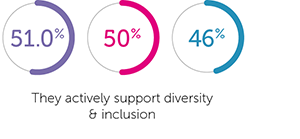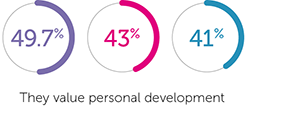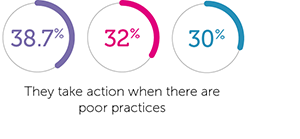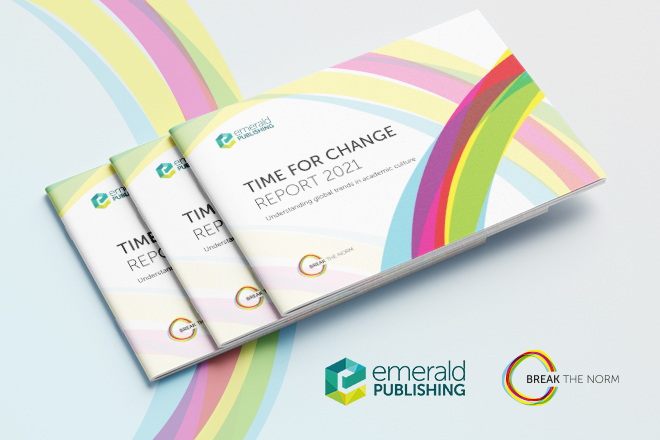The effects of working within academia across the globe is the focus of the questions within the academic culture section of the Time for Change survey.
Now in its fourth year, the survey overall explores the challenges within academic culture and gauges interest for change from across the globe.
Take a look at the main findings from the survey relating to academic culture and the key factors that are holding back or driving societal change.
On this page
Top findings
This global survey was conducted during July–August 2022, and in total received 1,427 responses from academics worldwide. The survey was open between 6 and 25 July 2022, and was sent to 204,967 contacts giving a 0.7% response rate
Increased support
Researchers are saying they are seeing an increase in support from their managers over the last year as well as their institution actively supporting on ED&I issues and making progress on providing more equal opportunities.
A fifth experiencing physical & mental health issues
The impacts of pressure in the academic workplace continues to affect sleep pattern of around one in eight, and nearly a fifth experiencing physical or mental health issues (this is significantly worse in Australasia, with nearly double that of other regions, with 47% of academics affected).
Women more affected than men
Women are more affected than men – more than double saying it is affecting their physical health (17%) and 14% their medical health. There’s a similar pattern for early career researchers who appear to be bearing the strain more than later stage career researchers.
Planning to leave
Nearly 60% of academics have thought about leaving, 4% plan to do so in the next 12 months, results broadly the same as 2021. Australasia has nearly doubled the number planning to leave in the next year, at 15%.
Inadequate funding & pressure to publish
Inadequate funding and resources, which has risen from 58% in 2021 to 63% in 2022, are the main pressure in academic life, followed by 55% saying pressure to publish (felt across all career stages) and 51% saying outdated management practices. Inequality remains a burning issue for nearly a third.
Questions

Q1. On a scale of 1 to 5 where 1 is strongly disagree and 5 is strongly agree, how much do you agree your institution does well in the following areas? (Average score out of 10.)











| Respondents who selected Agree or Strongly agree | My manager is supportive | They actively support diversity & inclusion | They value personal development | Their priorities are aligned to the SDGs | They provide equal opportunities for all | They focus on research that is aligned to the SDGs |
|---|---|---|---|---|---|---|
| Overall 2022 | 52.5% | 51.0% | 49.7% | 44.6% | 44.4% | 44.4% |
| Overall 2021 | 50% | 50% | 43% | 38% | 41% | 36% |
| Overall 2020 | 48% | 46% | 41% | - | 40% | - |
| Respondents who selected Agree or Strongly agree | They provide mentoring and networking opportunities | They fairly reward and recognise the contribution of employees | They provide access to mental health services / support networks | They take action when there are poor practices | They take action to ensure there is work/life balance |
|---|---|---|---|---|---|
| Overall 2022 | 42.6% | 40.9% | 39.2% | 38.7% | 37.3% |
| Overall 2021 | 36% | 34% | 36% | 32% | 30% |
| Overall 2020 | 32% | 31% | 38% | 30% | 28% |

Q2. On a scale between large negative effect to large positive effect, how much of an impact does your job have on the areas listed below?






Percentages show number of respondents who stated a large negative effect.
| Large negative effect shown in table | Your sleep patterns | Your physical health | Your mental health | Your ambitions / career motivation | Your family / personal relationships | Your motivation outside of your job |
|---|---|---|---|---|---|---|
| Overall 2022 | 12.4% | 10.7% | 9.7% | 8.1% | 6.7% | 6.5% |
| Overall 2021 | 12% | 10% | 9% | 8% | 8% | 5% |
| Overall 2020 | 13% | 8% | 9% | 8% | 8% | 6% |
Percentage of academics globally who stated that their job has a large negative effect on their mental health

| Large negative effect shown in table | Your mental health |
|---|---|
| Australasia | 20.0% (22%) |
| Asia | 4.6% (4%) |
| India | 6.5% (5%) |
| Latin America | 10.3% (8%) |
| ME&NA | 8.5% (10%) |
| N&WE & UK | 16.2% |
| North America | 16.5% (12%) |
| S&E Europe | 5.2% (6%) |
| Sub-Saharan Africa | 6.0% (9%) |

Q3. Have you ever considered leaving academia due to the culture, practices or pressure?




| Area % chosen | Occasionally | No, never | All the time | I am planning to leave in the next 12 months |
|---|---|---|---|---|
| Overall 2022 | 43.2% | 40.1% | 12.8% | 3.9% |
| Overall 2021 | 43% | 38% | 15% | 4% |
| Overall 2020 | 48% | 34% | 14% | 4% |
Percentage of academics globally who consider leaving academia all the time

| Large negative effect shown in table | Consider leaving academia all the time |
|---|---|
| Australasia | 31.7% (31%) |
| Asia | 12.3% (9%) |
| India | 7.2% (7%) |
| Latin America | 7.7% (12%) |
| ME&NA | 15.3% (10%) |
| N&WE & UK | 15.2% |
| North America | 23.3% (26%) |
| S&E Europe | 7.4% (11%) |
| Sub-Saharan Africa | 6.7% (10%) |

Q4. What do you think are the main pressures in academic life today? (Please select all that apply.)










| Area, % chosen | Inadequate funding/resources for research | Pressure to publish your research | Outdated institutional management practices and policies | Squeezed institutional budgets | Lack of a support network |
|---|---|---|---|---|---|
| Overall 2022 | 62.8% | 54.6% | 50.7% | 47.5% | 39.3% |
| Overall 2021 | 58% | 54% | 53% | 49% | 37% |
| Overall 2020 | 58% | 58% | 59% | 53% | 38% |
| Area, % chosen | Job security / Precarious contracts | Inequality | Pressure to prove the real-world impact of research | Pressure to gain tenure | Pressure of league tables |
|---|---|---|---|---|---|
| Overall 2022 | 32.6% | 30.1% | 26.7% | 26.3% | 15.7% |
| Overall 2021 | 34% | 31% | 26% | 26% | 18% |
| Overall 2020 | 38% | 32% | 24% | 29% | 19% |
"Difficulties to balance all teaching, research and management expectations due to limited resource." Woman academic in South Africa
"Lack of recognition of non-traditional routes to progression; difficulty getting research funding as a part-timer/ person with access needs/ female balancing academic role with mothering responsibilities et." Woman academic in UK
"No credit for well-cited or impactful papers outside of the "big 7" journals (in my field of business management - similar in other social sciences)." Man academic in Hong Kong
"Pressure to only conduct research that gains grants/funding/makes money." Man academic in India
"Untenable workloads" Woman academic in Australasia

2021 academic culture survey
Our third academic culture survey gathered views on change between July–August 2021. You can read the full Time for change 2021 report, here.

Are you in?
For championing alternatives to traditional academic metrics and rewards? Let’s work together to help the sector break ties with old measures of impact and enjoy a fairer, more equitable environment for research to thrive.

